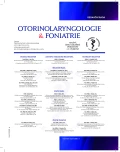-
Medical journals
- Career
The Specific Language Impairment in Bilingual Children
Authors: P. Kalitová; J. Mrkvičková; O. Dlouhá
Authors‘ workplace: Foniatrická klinika 1. LF UK a VFN, Praha
Published in: Otorinolaryngol Foniatr, 68, 2019, No. 3, pp. 135-142.
Category: Original Article
Overview
Introduction: The specific language impairment in bilingual children is a very difficult topic. There is a lack of studies related to specific language impairment in bilingual children. There is no study in the Czech population so far. The aim of our study was to analyze a group of bilingual children with specific language impairment.
Patients and Methods: We analyzed a group of bilingual children with specific language impairment. The results were compared to the group of monolingual children with the same diagnosis. Both groups underwent clinical speech examination and clinical speech tests. Results were compared and statistically analyzed. For statistical evaluation was used T - test.
Results: The results of entry examination were better in monolingual children and they have shown a better outcome of tests at follow up examination. The results of clinical examination of the speech correlated to results of clinical tests.
Conclusion: Based on statistical analysis we proved that bilingual education has a negative impact on speech rehabilitation in children with specific language impairment.
Keywords:
bilingualism – specific language impairment – native language
Sources
1. Cattani, A., Abbot-Smith, K., Farag, R. et al.: How much exposure to English is necessary for a bilingual toddler to perform like a monolingual peer in language tests? Int J Lang Commun Disord, 49, 2014, 6, s. 649-71.
2. Dlouhá, O.: Klasifikace poruch dětské řeči - od Seemana k dnešku. Otorinolaryng a Fonia./Prague/, 61, 2012, 4, s. 227-231.
3. Dlouhá, O. et al.: Poruchy vývoje řeči. Praha, Galén, 2017.
4. Gillam, R. B., Peña, E. D., Bedore, L. M. et al.: Identification of Specific Language Impairment in Bilingual Children: I. Assessment in English. J Speech Lang Hear Res, 57, 2014, 6, s. 2208-2220.
5. Haman, E., Wodniecka, Z., Marecka, M. et al.: How Does L1 and L2 Exposure Impact L1 Performance in Bilingual Children? Evidence from Polish-English Migrants to the United Kingdom. Front Psychol, 8, 2017, s. 1444.
6. Harding, E., Riley, P.: Bilingvní rodina. 1.vyd., Praha, Portál, 2008.
7. Kropáčová, J.: Výuka žáka s odlišným mateřským jazykem. 1. vyd., Olomouc, Univerzita Palackého v Olomouci, 2006.
8. Lechta, V. a kol.: Diagnostika narušené komunikační schopnosti. Praha, Portál, 2003.
9. Lejska, M: Poruchy verbální komunikace a foniatrie. Brno, Paido, 2003.
10. McCardle, P., Hoff, E.: An agenda for research on childhood bilingualism. In: McCardle P., Hoff E., (eds). Childhood bilingualism: Research on infancy through school age. Multilingual Matters; Clevedon, 2006, s. 157-165.
11. Morgensternová, M., Šulová, L., Scholl, L.: Bilingvismus a interkulturní komunikace. 1.vyd. Praha, Wolters Kluwer, 2011.
12. Neumann, K., Keilmann, A. et al.: Sprachentwicklungsstorungen bei Kindern. In Kindheit und Entwicklung. Gottingen, Hogrefe Verlag, 18, 2009; 4, s. 222-231.
13. Novák, A.: Foniatrie a pedaudiologie: Základy fyziologie a patofyziologie řeči, diagnostika a léčba poruch řeči, Praha, 1997.
14. Paradis, J., Schneider, P., Duncan, T. S.: Discriminating children with language impairment among English-language learners from diverse first-language backgrounds. J Speech Lang Hear Res, 56, 2013, 3, s. 971-981.
15. Průcha, J.: Dětská řeč a komunikace, poznatky vývojové psycholinvistiky. Praha, Grada Publishing, 2011.
16. Rinker, T., Sachse, S.: Multilingual specific langure impairment (SLI): Future directions for research. In: Reed A. (eds). Children and Language. New York: Nova Science Publishers, 2009, s. 279-284.
17. Říčan, P., Krejčířová, D. et al.: Dětská klinická psychologie. 4. vyd., Praha, Grada Publishing, 2006.
18. Skutnabb-Kangas, T.: Menšina, jazyk a rasizmus. 1. vyd., překlad Zuzana Drábeková, Bratislava, Kalligram, 2000.
19. Thordardottir, E., Cloutier, G., Ménard, S. et al.: Monolingual or bilingual intervention for primary language impairment? A randomized control trial. J Speech Lang Hear Res, 58, 2015, 2, s. 287-300.
20. Vernes, S. C., Nicod, J., Elahi, F. M. et al.: Functional genetic analysis of mutations implicated in a human speech and language disorder. Hum Mol Genet, 15, 2006, 21, s. 3154-3167.
21. Škodová, E., Jedlička, I. a kol.: Klinická logopedie, 2. aktualizované vyd., Praha, Portál, 2007.
Labels
Audiology Paediatric ENT ENT (Otorhinolaryngology)
Article was published inOtorhinolaryngology and Phoniatrics

2019 Issue 3-
All articles in this issue
- Development of Children´s Maxillary and Ethmoid Sinuses According to the Computed Tomography – Volumetric Study
- The Specific Language Impairment in Bilingual Children
- Measuring of Nasal Obstruction with Flowmeter and Classification of Nasal Endoscopic Evaluation
- Newborn Hearing Screening in Moravian-Silesian Region in 2017 and 2018
- „New Year´s“ Foreign Body in the Orbit
- Colopharyngoplasty in the Treatment of Postcorrosive Stricture of Swallowing Tract
- Tracheal Stenosis Caused by Nodular Goiter in a Patient after Previous Tracheostomy
- Rhino-orbital Mucormycosis
- Profesor MUDr. Jaroslav Fajstavr, DrSc., devadesátiletý
- Blahopřání k životnímu jubileu prof. MUDr. Romu Kostřicovi, CSc.
- Za Martinom Švecom
- 5. evropský ORL kongres –5th Congres of European ORL-HNS
- XVII. česko-slovenský kongres mladých otorinolaryngológov 2018
- Volby do výboru ČSORLCHHK ČLS JEP pro volební období 2020–2023
- Otorhinolaryngology and Phoniatrics
- Journal archive
- Current issue
- Online only
- About the journal
Most read in this issue- Rhino-orbital Mucormycosis
- Development of Children´s Maxillary and Ethmoid Sinuses According to the Computed Tomography – Volumetric Study
- The Specific Language Impairment in Bilingual Children
- Tracheal Stenosis Caused by Nodular Goiter in a Patient after Previous Tracheostomy
Login#ADS_BOTTOM_SCRIPTS#Forgotten passwordEnter the email address that you registered with. We will send you instructions on how to set a new password.
- Career

